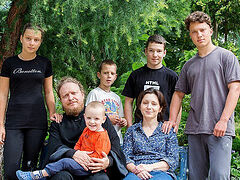Parents of teenagers are well aware of how hard it is for children during the transition age. All the child raising techniques that were once used more or less successfully no longer work. The Russian crisis psychologist Natalia Moteva talks about what you need to know about the your child’s new state and how to apply this knowledge in practice.
—Why are children no longer themselves as teenagers? What happens to them? Clearly, hormonal changes are at work; but what happens to their psychology at this period?
—To begin with, it should be said that the external factors of an age crisis are more pronounced than in any other crisis. That is, this is the most difficult one for their psychology: too serious changes occur with a person during this period. The crisis of puberty can only be compared with that at three years of age, when toddlers become hysterical, throw themselves on the floor and thrash with their hands and feet... And however odd it may sound, such behavior is within the normal range. However, for parents it is still stressful. During counseling sessions with a psychologist they say, “It’s as if it were not my child! It’s like he’s a completely different person! What is wrong with him/her?”
We need to understand what a crisis is in general. An age crisis doesn’t fit the definition of “good” or “bad”. During this period a child’s needs have grown and changed, but he has not yet discovered ways to satisfy them. The child is being torn apart by an internal conflict. At three years old he feels a need to do everything himself, but he has not yet understood how to manage it all. At the age of thirteen, fourteen or fifteen, a child loses the ability to understand who he is, what he needs and how to return to state of before. A teenager wants to feel good, but now he feels bad. Everyone annoys him. “Who are these people? Where are the people I want to be around? Do these people want to see me near them? Do they regard me as their own, or as a stranger? Who am I? What am I like?” With all these experiences, a teenager doesn’t have the strength to make contact with adults, because adults demand a lot from him. In adolescence the key activity changes, which in itself is a rather painful process. If earlier the key activity was getting to know the new, then in puberty it becomes communication with peers.
Noticeable physical changes, the appearance of secondary sexual characteristics, are also hard to see. Have you ever seen those movies where people switch bodies? This is how a teenager feels when he wakes up one day and finds himself as if in someone else’s body. He looks at his hands and thinks: “Are these mine? Do I really have such ugly hands?” I haven’t invented it—teenagers themselves tell me about it during counseling sessions. “I just recently realized what an ugly nose I have—I don’t want to go outside.” Adults often underestimate these experiences. “Stop it! You’ll get over it soon.” Modern children react more sharply to everything that happens to them than teenagers did a generation ago.
—What is the main difference between modern children and those of previous generations, from a psychologist’s point of view?
—A person becomes an adult. What does it mean? It means that he takes responsibility, has duties, and as a result he has rights. And it’s almost magic. For many modern children the opposite is true: They try to make a chrysalis out of a butterfly. They want many, many rights and demand them, failing to understand that there must first be responsibilities, because this is how the world works. In order to fly on an airplane you must first earn money and buy a ticket. That is a law.
 Natalia Valerievna Moteva, psychologist —And this, of course, annoys adults and leads to interactional problems. But still, the parent plays a leading role in communication. What other mistakes do parents make, besides devaluing the child’s experiences?
Natalia Valerievna Moteva, psychologist —And this, of course, annoys adults and leads to interactional problems. But still, the parent plays a leading role in communication. What other mistakes do parents make, besides devaluing the child’s experiences?
—Let’s imagine a situation. A child comes home and throws his briefcase in the middle of the room. He did this in primary school, his mother was lenient towards it, and he was used to it. And now his mother is looking at him, a robust big boy six feet tall, and to her he seems to be an adult and therefore he should already understand that throwing a briefcase in the middle of the room doesn’t befit a grown-up. She starts shouting at him. But he is not an adult—he is only thirteen. Her reaction seems hurtful and unfair to him, so he says something in response. She is indignant, and you have a ready conflict.
—How can one have a peaceful conversation?
—You won’t be able to have a peaceful conversation with a teenager. I will digress and say that we are talking about situations where a child has become more aloof, rude, and so on. Because there are parents who say: “I didn’t notice any transition period at all.” But we are talking about the parents who ask: “Oh, help me! This is a nightmare.”
Talk to your teenage child as if he were a stranger, as if he were new and interesting company. Get to know him again. Accumulate the strength to communicate with him carefully and attentively. What is so difficult about that? Communication with a stranger is “horizontal”: we bear no responsibility for each other. Someone else’s child has parents who will feed and clothe him: it’s their problem that he doesn’t go to school and so on. And you can just talk to him. With your child you perceive everything through the following prism: “I feed and clothe you, but you!…” This approach should be weighed, and while talking to your child leave your complaints behind the scenes. You can share your experiences with friends or discuss them with your spouse: “What a rude boy!” But with your child behave as if an unknown, interesting person were sitting in front of you. He has his own opinions, to which you will listen even if you totally disagree with him. “Why do you listen to this kind of music? What attracts you to it?” And no one is interested in the argument: “But I was different at your age!”
How often it happens! A child says, “Look at the video I’ve found! Ha-ha!” And you look over his shoulder and reply: “What junk! How can you watch it? It’s nonsense!” You don’t even try to understand what interests him there. You should be careful with value judgments, because they can fly back in your face: “You old folks don’t understand anything at all.” I emphasize this with four red exclamation marks on both sides: Respecting a child does not mean agreeing with him in everything. But the form of your statements should be as proper as possible.
“Swearing in front of girls means (so-and-so) to me. Getting tattoos is, to my mind (so-and-so). And what does this mean to you?” And you listen to his answer with interest.
You shouldn’t expect that the old relationship will be restored as a result of certain actions within two weeks. There is such a parable. You used to have a dog, you knew how to have contact with it, and everything was fine. But one day you come home and find a cat instead of a dog. It behaves absolutely differently! It meets you in the wrong way, and when you give it food, the cat decides whether to approach it now or when you leave the room. This doesn’t mean that it will always be like that! After some (long) time, everything will return to normal if you manage to survive this period.
—But if I don’t survive it?
—Well, you’re an adult—ponder over what you can do to achieve this. Who can help you with this and how can you help yourself? Why did I say it’s important to survive? You can tell an adult who is feeling terrible that you have no strength to help him. But you can’t say the same to your child, because he depends on you. So you have to survive with someone who has turbulent emotions, who feels bad. And a child needs to live through this hard period from beginning to end, to feel it deeply and think it through. It is useless to try and speed it up. It is pointless to make a chrysalis to turn into a butterfly instantly. We all know what happens to plants and animals that are fed with growth hormones—we can hardly eat them.
— Then how should we bring up a teenager?
—Just as you did when your child was small. I like this example. Babies don’t wear pants because we tell them to wear pants, and they don’t say hello to others because we tell them to say hello. They see how we feel about the world, whether we love our jobs or not, whether we are interested in going out or not, how we feel about what we are indifferent to... Children “read” this information unconsciously and reproduce it. Do you want your child to behave in a certain way? Behave in this way yourself.
If you speak with your child sincerely and with respect, he will gradually adopt what he sees in his parents. But you need to know and remember that this will not happen two weeks after you begin to control yourself. It may take several years before you see the fruits of your efforts. One of the teenage protests that prepares them for adulthood is the protest against their parents’ lifestyle: “I’ll do it any way but the way you do it.” Since he must find his path, this is an age feature. Even if the parent is a doctor who saves human lives, his teenage child wants to do something different.
An opinion without arguments is a value judgment
—It often happens that a teenager challenges everything in a conversation. Why do you need to prove obvious things to him, that white is white and black is black?
—It is very useful. Firstly, you yourself develop the skill of critical thinking, and secondly, you teach this to your child. You analyze incoming information, question it, and look for arguments to support your opinion. Because an opinion without arguments is a value judgment. Thirdly, you train yourself to remain emotionally stable in situations of uncertainty. If you’ve failed to prove your opinion, what will you do? Will you take a break or start shouting? So talking to a teenager is a very useful exercise. And discussion is the best way to interest and entertain a child. Do you like the Russian rapper Morgenstern? Explain and give arguments.
Teenagers need to be taught to formulate. When they say, “I don’t want to,” they often simply cannot explain what is happening to them. Grown-ups don’t even let them speak out and criticize them all the time. It is important for parents to listen to their child, helping him with leading questions, without criticism or value judgments. Tell him sincerely what you think and what you feel. “You don’t want to go to school? I believe you are fed up with everything. But I fear. It seems to me that it will always be so, that you don’t want anything now and will waste time.” A teenager, too, cannot understand an adult—you need to explain your position to him.
—You mentioned that it is hard for teenagers to make contact with their parents because of numerous demands on their part. Is it possible to strike a balance and make demands without burdening a child?
—In vertical parent-child relationships you have to make demands on your child. You have a right to it. Realizing this right, you feel more confident. What could you demand? Anything. For instance: “I want you to learn how to bake sweet rolls.” The child answers you: “I don’t want to.” “You have a right. But I would like you to. And I’ll teach you how to bake sweet rolls.” You just should keep in mind that there can be no more than three demands. And if this is an exhausted child or he is resisting you actively, then only one.
In any case, parents have requirements for their children, but they are often vague. Parents often try to manipulate their children, and it’s better not to do that. They should clearly formulate something very specific and narrow. Not: “I want you to become a baker”, but “I want you to learn how to make sweet rolls”. It is also important to declare that the parent will make every effort to ensure that his requirement is fulfilled. He will not just declare and expect that the child will do everything himself, but will help him, organizing the process.
—Can you demand that he go to church?
—It is better to discuss with the priest whether the parents should make children go to church. From the point of view of behavioral psychology, there can be any demand, but it must be clearly formulated. To come to church (bring your body there) is one thing, but it’s another thing to come to church with a desire, stand there quietly, pray, confess and take Communion… There are many of requirements here. You can demand only one thing, but whether the child will do something more is up to him. You can thank him if he has done something more—something that you did not even hope for. Not only did he come to church, but he also confessed his sins. “Thank you very much. I’ll bake a cake on this occasion.”
As soon as the child understands that he is safe and that the parent is trying to adapt to his changes, he will become calmer. I always tell parents in counseling sessions that they shouldn’t pamper and spoil their children. But it’s important for us as adults to take responsibility for organizing living conditions for our teenage children. Because a child himself cannot organize anything during the teenage crisis. This responsibility lies with the parents.




